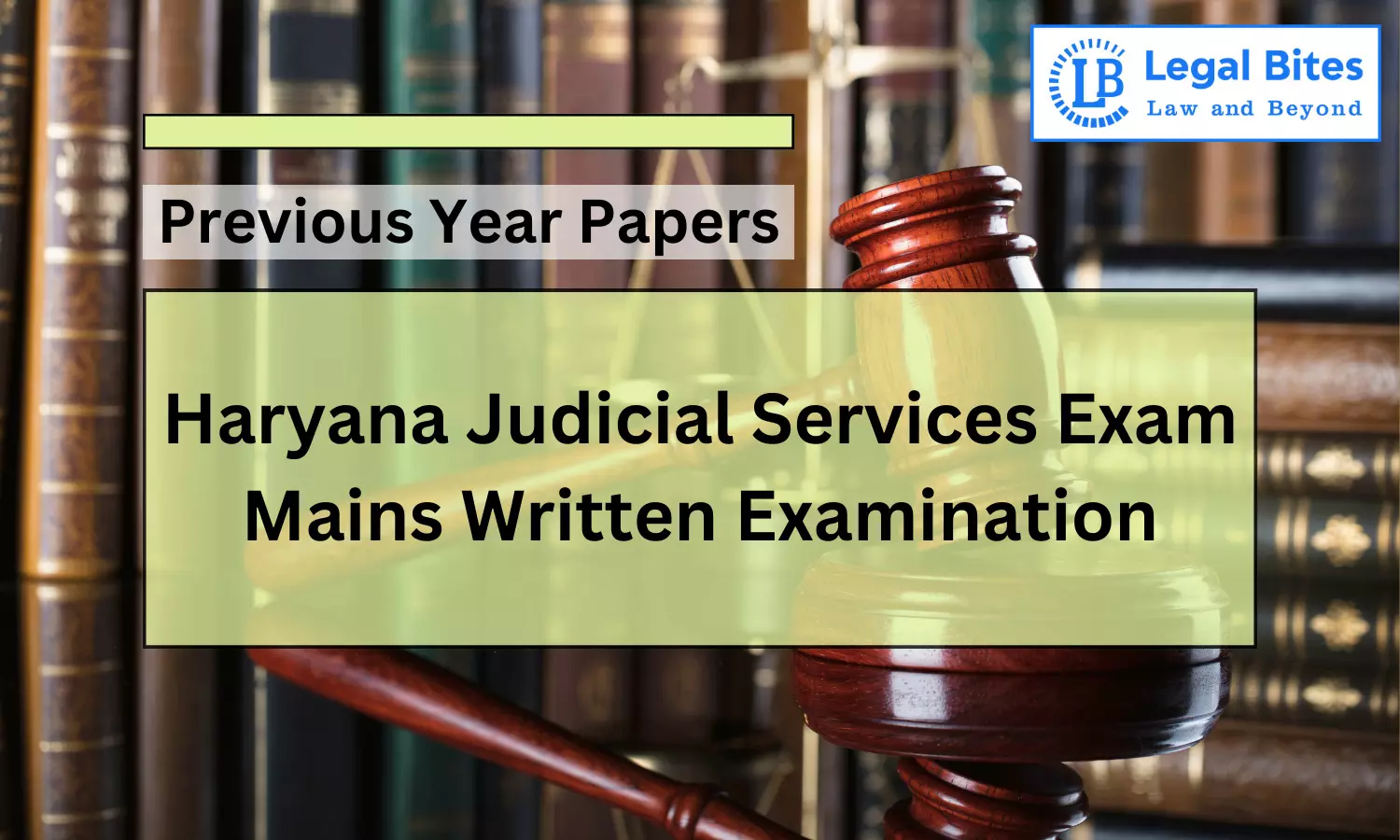Haryana Judicial Services Mains 2022 Previous Year Paper (Civil Law - II)
Candidates preparing for Haryana Judicial Services should solve the Haryana Judicial Services Mains 2022 Previous Year Paper and other previous year question papers before they face Prelims and Mains.

Candidates preparing for Haryana Judicial Services should solve the Haryana Judicial Services Mains 2022 Previous Year Paper and other previous year question papers before they face Prelims and Mains.
Additionally, it gives an idea about the syllabus and the way to prepare the subjects by keeping the previous year questions in mind. All toppers are mindful and cognizant of the types of questions asked by the HCS, to be aware of the various tricks and types of questions. This should be done by every aspirant when starting their preparation. It is very important to have an overall understanding of the pattern and design of questions.
Only practising authentic question papers will give you a real feel of the pattern and style of the questions. Here's Haryana Judicial Services Mains 2022 Previous Year Paper (Civil Law - II).
Haryana Civil Services (Judicial Branch) Mains Written
Examination 2022
CIVIL LAW – II
Time: 3 Hours
Maximum Marks: 200
Notes:
- Attempt all questions in the same order in which they appear in the question paper.
- Marks for individual questions are indicated against each question.
- Support your answers with relevant provisions and case law.·
- No extra answer sheet will be provided.
Question 1
(a) What are the changes made in the Hindu Succession Act 1956 by Act 39 of 2005 as regards succession to ancestral property by a Hindu female? Cite latest case law on the point. (15 Marks)
(b) 'A' a Hindu alienates coparcenary property in the lifetime of his son B without B's consent and without justifying necessity. B dies 2 years after the sale. 6 months after B's death, another son C is born to A's wife from A. Advise about C's right to challenge the alienation of property made by his father. (10 Marks)
(c) Anjali, a Hindu girl wants to marry a Muslim boy, without relinquishing her faith. Discuss in detail with relevant provisions and procedure under which law she can marry. (15 Marks)
Question 2
(a) Elaborate on concept of void and voidable marriages regarding Hindus. What is the status of children born to persons whose marriages are void and what are rights of such.a child? (10 Marks)
(b) A boy and a girl want to marry each other. The boy is the girl's paternal aunt's son. Explain whether the marriage in this relationship would be valid as per the
Hindu Marriage Act. (10 Marks)
(c) A widower or a bachelor adopts a child. He later marries. What would be the status of the wife viz a viz the child? Give reasons for your answer. (10 Marks)
(d) Sunaina and Kartik got married as per the norms of Hindu law. When they were not blessed with a child for more than 3 years they consulted a Doctor. After examining both of them, the doctor disclosed that medical issues are with Sunaina. She started taking the necessary treatment for infertility but could not conceive. She insisted that Kartik should divorce her and get a progeny for himself. Frustrated, Kartik adopted a baby boy without consulting his wife. Can the child be considered the adopted child of Sunaina and Kartik under the Hindu Adoption and Maintenance Act, 1956? (10 Marks)
Question 3
(a) What are the grounds on which an order granting maintenance by a court be varied by it later? Explain. (10 Marks)
(b) Can a child in the womb at the time of death of an intestate inherit the property of the intestate? If so, when does such inheritance vest in him? (5 Marks)
(c) Explain the concept of adverse possession briefly with reference to case law. (15 Marks)
(d) Explain the difference between applicability of Section 5 and Section 14 of Limitation Act 1963 to suits. (10 Marks)
Question 4
(a) Can a property, in the absence of any evidence as to who created the wakf, be considered a wakf property? Explain. Also, discuss the circumstances wherein any sale, gift, lease, exchange, mortgage or transfer of waqf property shall be void ab initio under the Waqf Act 1995. (15 Marks)
(b) Explain the legal position regarding talaq-e-biddat in Muslim Law. (10 Marks)
(c) Elaborate on the concept of Judicial Separation and Divorce and also the difference between them. (15 Marks)
Question 5
(a) Write in detail the grounds for dissolution of a Muslim marriage and emphasize on the effect of conversion to another faith with regards to dissolution of Muslim marriage. (10 Marks)
(b) Explain as to whether a document which narrates only the pre-existing title to a property, is compulsorily registrable under the Registration Act. (5 Marks)
(c) What is the effect of non-registration of a document which is required to be registered? (5 Marks)
(d) Write Short Notes on
(i) Natural, De Facto and De Jure Guardian. (10 Marks)
(ii) Easementary Right. (10 Marks)

